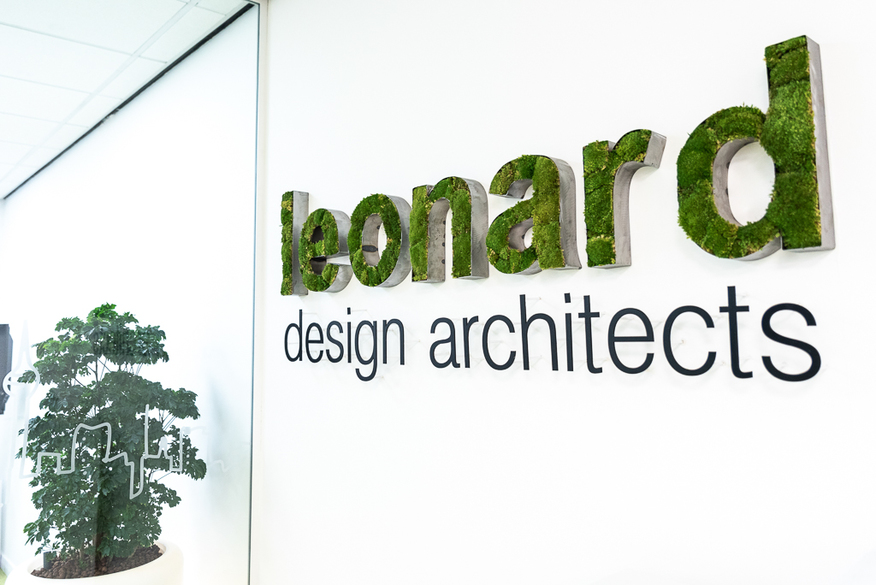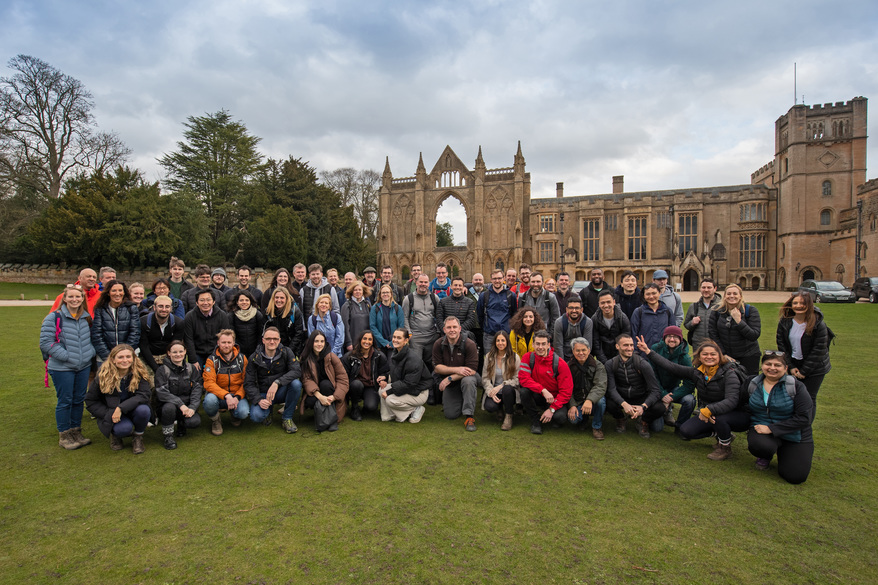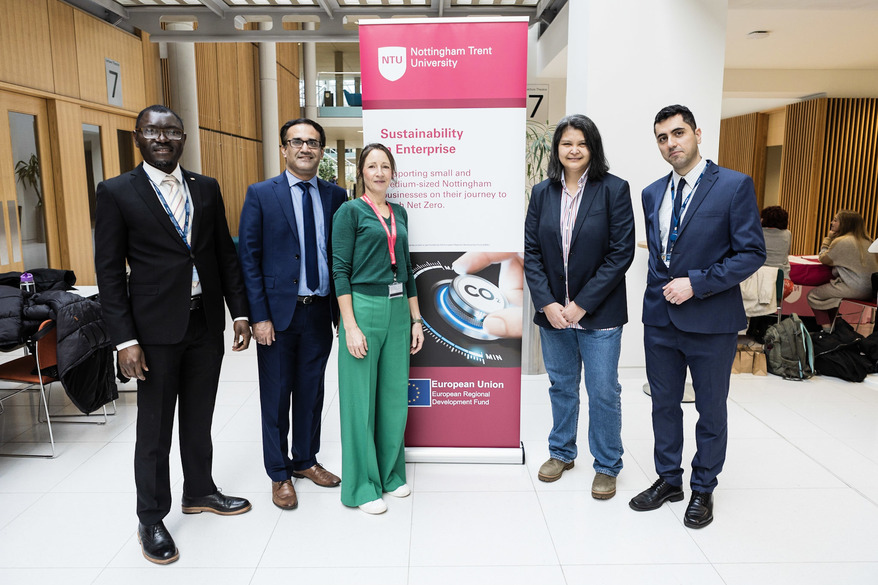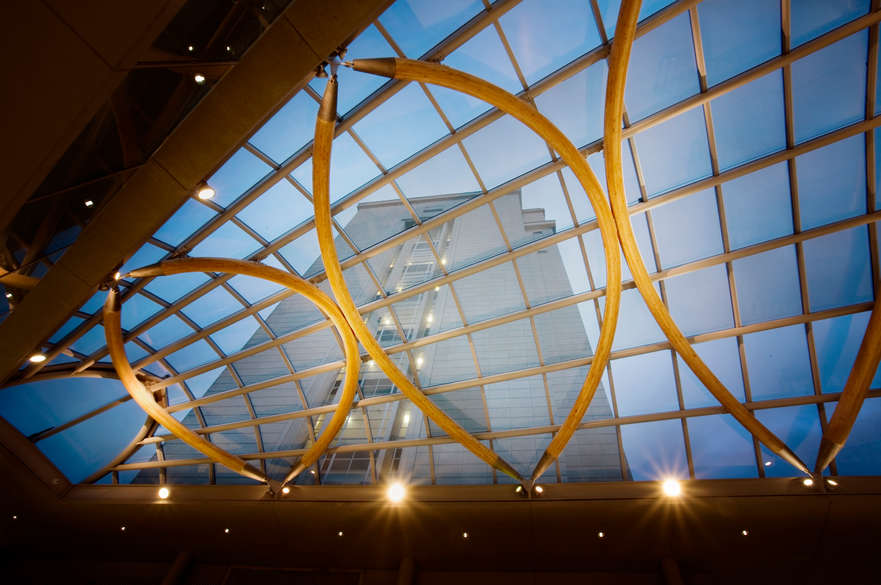Sustainability in Enterprise - Leonard Design
Green architecture firm on track to reduce carbon emissions by almost 50% following sustainability support from NTU’s student consultants.


Leonard Design is an award-winning architecture practice with a specialist focus on commercial architectural design and consultancy. The practice works with design leaders across five continents to deliver projects across a range of sizes. From master planning for new streetscapes, communities and cities, to architectural and interior design for mixed use town centres and one-off houses. Leonard Design works globally, regionally and locally; always tailoring design to the specific needs of the people, place and environment involved.
According to the World Green Building Council, buildings are currently responsible for 39% of global energy related carbon emissions. 28% comes from operational emissions - the energy needed to heat, cool and power buildings, and 11% from materials and construction – the embodied carbon. In the UK, the built environment is directly responsible for 25% of the total UK carbon footprint, with homes accounting for 16%.
To help tackle the issue, Leonard Design has opted into the Royal Institute of British Architects (RIBA) 2030 Climate Challenge, which aims to achieve net zero carbon for the whole UK building stock by 2050. The practice has also created Leonard GREEN, an internal business group championing sustainability through the practice’s design process. From initial concepts through to detailed design and materials selection.
Now, Leonard Design wants to go even further to champion sustainability. Through NTU’s Sustainability in Enterprise project, the practice has been working closely with a team of student consultants supported by academics with expertise in sustainability and carbon management, to calculate their carbon impact and put an action plan in place to reduce emissions.

The Leonard Design Team
We spoke to Leonard Design’s Facilities Manager, Susan Hayes and HR Manager, Estelle Morris to find out how they and the practice have benefited from the support on offer.
Estelle explained: “We joined the programme to educate ourselves, so we could improve on what we’re already doing through our Leonard GREEN initiative. One of the main things we wanted to do was develop a sustainability strategy and plan for the business as a whole, to bring our various sustainability initiatives together. We had a lot of big goals but we knew it was important not to run before we could walk. Working with students and academics from NBS helped bring us back to basics.”
Susan agrees: “We’re great when it comes to championing sustainable design and green building projects, but we knew we needed to look at ourselves as a business and see where we could reduce our own carbon footprint.
“In their role as sustainability consultants, a small team of NBS students came into the office to find out more about us and explain what information they needed from us to assess our carbon impact, including details of our energy consumption. They were all doing a sustainability and carbon management module as part of their studies, so they were able to give me lots of guidance. They were really engaged when it came to learning about what we do and asked the team here loads of questions.”
The student consultants used the resource data Leonard Design had provided to calculate their carbon emissions impact with support from academic tutors. They then created a presentation to share their findings with Leonard Design.
Susan continued: “This was our first carbon footprint so we weren’t quite sure what to expect. The student consultants presented to us at NTU and it was very impactful. Subsequently, we asked them to come and present to the whole company, including our senior management team. Their presentation brought our carbon impact to life, and gave us recommendations for what we could do to reduce it, in a way that we can all engage with.
“The students found that 87% of our energy consumption in 2021 came from our computer usage, and 7% from lighting. Seeing that visually was really powerful and has kickstarted us into another level of action.”
What we’re doing now

Key members of the NBS team supporting our student consultants
NBS’s student consultants are in their final year at Nottingham Business School (NBS) and come from a broad range of undergraduate courses including accounting and finance, economics, marketing, and management. Key members of the team supporting our student consultants are NBS project lead Dr Muhammad Mazhar, consultancy project coordinator Helen Taylor, and the academic team made up of Dr Justin Udie, Dr Ramez Kian, and Al Dharmasasmita.
The student consultants’ recommendations included replacing CFL bulbs with LED bulbs to reduce lighting energy, investing in EMCO Remote Shutdown software to automatically turn off network PCs when not in use, and an e-learning course to help Leonard Design measure, reduce and offset their carbon footprint.
Susan said: “We’ve taken all the student’s key recommendations on board. We’ve already switched to greener light bulbs and have costed up replacing all our bulbs with LEDs. We’re currently trialling the remote shutdown software in our Nottingham and London offices and are planning to roll it out across the team. The e-learning course will give us the tools we need to work out our own carbon footprint, and help us build on the consultancy support we’ve been given.”
Estelle continued: “We’ve cut down on our travel, especially abroad, and are holding meetings online whenever possible. Flexible working has also reduced the amount of time our people spend commuting, and our car use. Alongside what we’re doing to cut our own carbon footprint, we’re also working on our RIBA 2030 action plan, looking at how we can support our clients to design, construct and use buildings more sustainably, and reuse and recycle materials.”
Leonard Design also had support from NTU’s Helen Taylor to develop their vision statement for sustainability. Helen explained: “Businesses need to adopt a bottom up and top down approach to sustainability that meets in the middle. Sustainability is part of everyone’s role, it shouldn’t just be driven by senior management teams. That’s exactly what Leonard Design is doing. Through the vision board workshop, they brought their teams together to collaborate on how to share their sustainability journey with colleagues, clients and suppliers, and be visible and transparent. In any business, everyone should know how to approach sustainability and be empowered to take steps in their role to make a collective impact.”
What we’re doing next

Susan said: “As well as looking at our energy use, we’re starting to look at other areas of the business. From choosing more sustainable office products and local suppliers, to introducing a flexible green pension scheme which will go live in July, and a cycle scheme as part of our staff benefits package.
“It’s a constant learning curve, but the more we educate ourselves on sustainability, the more we can educate our clients. As part of that, we’re building sustainability into all our design specifications and giving our clients more sustainable options. For example, by retrofitting and reusing existing buildings.”
Estelle continues: “We’re bringing sustainability into more of our HR initiatives, such as offering to buy our colleagues air cleaning plants when they win one of our staff-nominated ‘above and beyond’ awards. The idea has really taken off and we’ve invited Urban Planters, one of our suppliers, to lead a staff workshop on air cleaning plants. It’s good to learn from the sustainable design practices we share with our clients, such as creating community-led green spaces, and bring that back into the business.”
The impact
The students’ proposed recommendations could help Leonard Design save 8.8 tCO2e of carbon emissions a year, reducing their carbon footprint by almost 50%.

The student consultants found that Leonard Design’s 50 computers were costing the practice over £8,000 a year in energy costs. Investing in software to avoid computers being left on standby would save approximately 66% in energy costs.
In addition, the student consultants found that switching to LED light bulbs would reduce Leonard Design’s lighting energy consumption by between 50%-70% making a significant contribution to carbon emissions reduction.
Overall, students’ proposed recommendations could help the company save 8.8 tCO2e of carbon emissions a year, reducing Leonard Design’s carbon footprint by almost 50%.
As well as significantly reducing their energy use, Susan believes working with NBS has made Leonard Green much more aware of what they need to do to reduce their carbon footprint.
“Going back to the drawing board and developing our sustainability strategy and plan will give us a manageable approach to sustainability. Little steps done right are better than doing too much too soon, and will soon lead onto bigger things. We recently held a workshop to see what we achieved last year, and we’ve come further than we thought. When we design a sustainable building we can see it take form, whereas improving our sustainability as a company is more intangible. The workshop helped our progress to take form, which was really inspiring.
“A lot of our clients are asking us to report on our carbon impact and the support we’ve had from NTU has given us a great starting point to work from. As a company, we’re very open to ideas and are always looking at how to better ourselves. The Sustainability in Enterprise project has helped enable that.”
Helen concludes: “From a student perspective, giving final-year Nottingham Business School students an opportunity to learn about carbon management and sustainability at a time when it’s critical to businesses is key. Businesses need the skills, expertise and knowledge to take them to net zero, especially SMEs. Working with businesses like Leonard Design also gives students soft skills for employability and to manage the complexities of sustainability – critical thinking, resilience, emotional intelligence and problem solving. If students have some expertise they’re going to be valuable – no matter what their role or level in a business.
“For businesses, the project gives them free consultancy from students and tutors, alongside a carbon footprint and recommendations to save money and carbon, helping them contribute to local and national net zero goals by building their knowledge and experience.”
How to access the support available
Find out more about the broad range of support that NTU is providing to local businesses:
- Email: workingwithyou@ntu.ac.uk
- LinkedIn: NTU Business and Employers
- Twitter: NTU Business and Employers